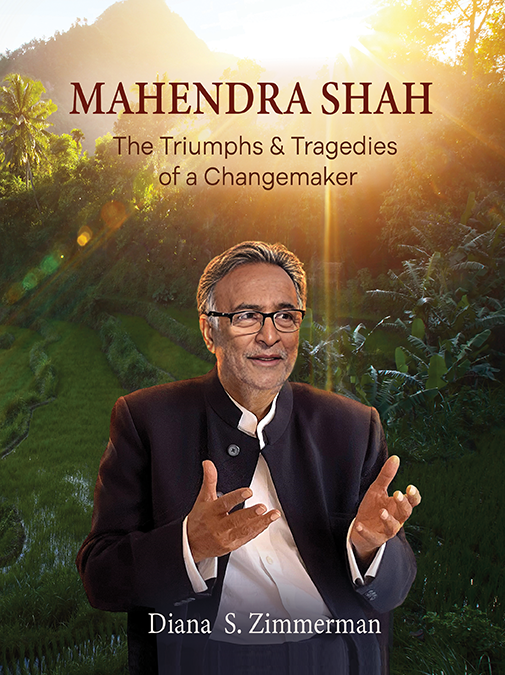Mahendra Shah: The Triumphs & Tragedies of a Changemaker
Written by Diana S. Zimmerman
ISBN 9798859303915
Available here on Amazon.com
As its name implies, this book is a story of triumph and tragedy, filled with adventure, passion, defiance and, sadly, even defeat in the international game of global climate change, food and crop manipulation, and economic control.
Of Indian heritage, Mahendra Shah was born in 1945 in Kenya. One of five children, he grew up in a small two-bedroom house in Nairobi. Every morning, his mother took him and his four sisters on a mile-long hike to feed the pigeons in Nature Park. Along the way, she would occasionally see a struggling beetle on its back and help it to turn over, stressing to her children that “It is the obligation of humans to respect and care for all creatures that share this planet—that every life is precious, no matter how small.”
This philosophy would guide the young man throughout his life, a life that is skillfully and visually brought to the written page by bestselling author Diana S. Zimmerman, herself an environmentalist and animal activist.
The book begins in October 1984, with the horrific famine in Ethiopia. The following month, Shah was appointed as Director of Information for the United Nations Office of Emergency Operations in Africa dealing with this crisis. His descriptions of the situation during those dark years won’t leave the reader untouched.
From there, the author turns back to Shah’s childhood in Kenya, followed by his two years at Leicester College in the UK, then earning a PhD at Cambridge in Control System Theory. Returning to Kenya, the young man worked at the University of Nairobi for five years as well as other projects to contribute to Kenya’s sustainable development.
While there, he worked with the locals to combat the appalling crisis of wildlife poaching and the suffering of elephants slaughtered for their tusks. One heart-rending experience involved saving a baby elephant who was trying to get its dead mother to respond. He reminisces that the year he spent working on the Kenya Wildlife Big Five Survey Benchmark Project is one of his fondest memories. Importantly, it triggered a crucial step forward in helping to protect Kenya’s wildlife.
Before long, Shah’s activities caught the attention of Maurice Strong, the first director of the newly created United Nations Environmental Programme (UNEP). Strong saw something in the young man and soon became his mentor, inviting him to attend the UN’s first Global Human Environment Conference in Sweden in 1972. Shah got a firsthand look at how global politics was hampering progress in helping to ensure the health of our people and planet.
The reader also gets a glimpse into the customs and practices of the Jain religious community in Kenya, including the traditional Jain multi-step marriage rituals that took place when he wed his wife, Arti, in 1975.
Shortly after his wedding, he accepted a position with an international agency in Vienna, which began a many-decade career in various organizations, and he soon became a major multi-disciplinary player on the world socio-economic and environmental stage. From the World Bank to the United Nations and its many agencies, he was victorious in those areas where leadership rose above personal gain, greed, and political elitism to create real transformations. But he has also faced jealously, bigotry and great frustration by the unending lack of will by many in power to facilitate real change to protect the planet.
Yet, the accolades for his work are many. Among them, Bradford Morse, UN Undersecretary General commented, “There are literally hundreds of thousands of people alive today in Africa because of the unique and creative information system Mahendra Shah developed.” Jean Paul Close, Founder, Sustainocracy.blog, stated, “Mahendra’s efforts to enlighten so-called world leaders may not have always paid off, but he has planted the seeds for achieving sustainable development.”
The author thoughtfully details Shah’s frustrations with the slowness that the seeds are taking root, and she describes how he came to the ultimate conclusion that there can be no sustainable development unless individual humans begin to live responsibly and sustainably in harmony with Nature.
For Shah, this individualistic approach led him to create Zen Resort Bali, providing a sustainable holistic lifestyle and activities, emphasizing well-being, awareness of Nature, and harmony. In his words, “Our mission is to give guests experiences of physical, mental, emotional and spiritual well-being, a pre-requisite to mobilize their compassion and empathy to live in harmony with one another and with Nature. This is the critical global challenge in the decades ahead.”
Over 500-plus pages, Zimmerman describes the highs and the lows of Mahendra Shah’s story, both professionally and personally, with delicacy and clarity. It’s worth the read.
Join our Newsletter Donate to bring Wild Happiness to communities and wildlife Follow us on socials!
